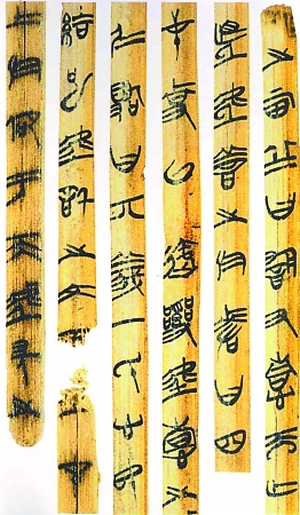Confucius
Confucius (551–479 BC) was a Chinese philosopher and politician of the Spring and Autumn period. The philosophy of Confucius, also known as Confucianism, emphasizes personal and governmental morality, correctness of social relationships, justice, kindness, and sincerity. His teachings, preserved in the Lunyu (Analects), have been profoundly influential in the development of Chinese civilization and have shaped the moral foundation of East Asian society for centuries.
Life[edit | edit source]
Confucius was born in the state of Lu (present-day Shandong Province, China). Little is known of his early life, though it is traditionally said that he was a descendant of the royal house of Zhou. He entered a career in civil service but became disillusioned with the politics of his time, dedicating most of his life to teaching a wide range of subjects to a group of loyal disciples.
Philosophy[edit | edit source]
Confucius's philosophy centered on the principles of benevolence (ren), ritual propriety (li), and righteousness (yi). He believed that the key to achieving a harmonious society was through virtuous leadership, advocating for rulers to lead by example and to cultivate moral perfection in themselves. Confucius also emphasized the importance of filial piety (xiao), viewing it as the foundation of all virtuous behavior.
Analects[edit | edit source]
The Analects of Confucius is a collection of sayings and ideas attributed to him and his disciples. It is the most important source of Confucianism, reflecting the range and depth of his philosophical insights. The Analects has been a fundamental text in Chinese education for centuries, shaping the moral character of countless individuals.
Impact[edit | edit source]
Confucius's teachings have had a lasting impact on East Asian thought and values. During the Han Dynasty, Confucianism was adopted as the state ideology, leading to its spread throughout China and neighboring regions. Confucius's ideas on education, governance, and social harmony continue to be revered, and his birthday is celebrated as Teachers' Day in several Asian countries.
Legacy[edit | edit source]
Confucius is revered as one of the greatest teachers in Chinese history. His influence extends beyond China, affecting philosophical thought and cultural practices throughout East Asia, including Japan, Korea, and Vietnam. Confucianism remains a significant philosophical tradition, influencing modern discussions on ethics, governance, and social responsibility.
This article is a philosophy-related stub. You can help WikiMD by expanding it!
Search WikiMD
Ad.Tired of being Overweight? Try W8MD's physician weight loss program.
Semaglutide (Ozempic / Wegovy and Tirzepatide (Mounjaro / Zepbound) available.
Advertise on WikiMD
|
WikiMD's Wellness Encyclopedia |
| Let Food Be Thy Medicine Medicine Thy Food - Hippocrates |
Translate this page: - East Asian
中文,
日本,
한국어,
South Asian
हिन्दी,
தமிழ்,
తెలుగు,
Urdu,
ಕನ್ನಡ,
Southeast Asian
Indonesian,
Vietnamese,
Thai,
မြန်မာဘာသာ,
বাংলা
European
español,
Deutsch,
français,
Greek,
português do Brasil,
polski,
română,
русский,
Nederlands,
norsk,
svenska,
suomi,
Italian
Middle Eastern & African
عربى,
Turkish,
Persian,
Hebrew,
Afrikaans,
isiZulu,
Kiswahili,
Other
Bulgarian,
Hungarian,
Czech,
Swedish,
മലയാളം,
मराठी,
ਪੰਜਾਬੀ,
ગુજરાતી,
Portuguese,
Ukrainian
Medical Disclaimer: WikiMD is not a substitute for professional medical advice. The information on WikiMD is provided as an information resource only, may be incorrect, outdated or misleading, and is not to be used or relied on for any diagnostic or treatment purposes. Please consult your health care provider before making any healthcare decisions or for guidance about a specific medical condition. WikiMD expressly disclaims responsibility, and shall have no liability, for any damages, loss, injury, or liability whatsoever suffered as a result of your reliance on the information contained in this site. By visiting this site you agree to the foregoing terms and conditions, which may from time to time be changed or supplemented by WikiMD. If you do not agree to the foregoing terms and conditions, you should not enter or use this site. See full disclaimer.
Credits:Most images are courtesy of Wikimedia commons, and templates, categories Wikipedia, licensed under CC BY SA or similar.
Contributors: Prab R. Tumpati, MD





